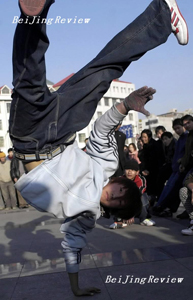|  Last month in Shanghai, the American rap icon Jay-Z's debut concert in China was canceled by the Ministry of Culture, who claimed this was in the interests of protecting local hip hop fans from his nasty lyrics. Last month in Shanghai, the American rap icon Jay-Z's debut concert in China was canceled by the Ministry of Culture, who claimed this was in the interests of protecting local hip hop fans from his nasty lyrics.
But interestingly, under the hip hop category of Baidu Tieba, an Internet forum provided by Baidu.com, China's largest search engine company, there are many postings such as, "I am looking for a hip hop boyfriend, please leave your QQ [a domestic instant messenger] number here if you are interested", or "I want to make friends with hip hoppers who are between 18 and 25".
Sadder is this posting: "I just broke up with my girlfriend because she likes those who dress in hip hop style, which I'm not quite into," said Li Xiaoyang, 19, a Beijing subway worker and hip hop DJ amateur.
It seems that these days, hip hop is a growing trend among Chinese youth. Take a walk in downtown Beijing, you'll come across "Eminems" from time to time: urban kids wearing loose trousers, colorful T-shirts, headbands, necklaces and metal chains with monstrous images. In malls, video shops, bars and radio stations, songs by groups like Eminem and Black Eyed Peas are frequently played. In every university, one can easily find a hip hop dancing class and the national college hip hop dancing competition has been held for the past four years.
But don't jump to the hasty conclusion that this means the hip hop craze has put down deep roots here in China. In fact, "most of the self-proclaimed hip hop fans are superficial," insists music critic Hu Pan. "I don't mean that they are fake fans, but what they like about hip hop music is all surface. They don't get down to the core of the music."
"Hip hop is considered a fashion and cool stuff here, so some young guys just use it as a tool to hook up with girls," said Hao Yu, an indie hip hop MC (microphone controller) from Heilongjiang Province. The media dubbed him as China's first post graduate majoring in hip hop music when he entered the China Academy of Arts in 2005.
The term hip hop refers both to a musical and cultural genre or movement developing predominantly among urban African Americans. There are four fundamental elements in hip hop: hip hop dance, graffiti, DJ and MC.
Chinese hip hop is a relatively new phenomenon. In the 1990s, the genre first spread to Japan, the Republic of Korea, Taiwan and Hong Kong. In 1997, the Korean hip hop group H.O.T hit China like a bomb and hip hop began to gain huge popularity among mainland teenagers. The success of the megastar Eminem further enhanced the trend.
Bleak local scene
Currently, foreigners dominate hip hop music in China and the domestic scene seems rather bleak.
"I've talked to people in the record business and many music fans; few are interested in hip hop music, much less than those who like rock music and electronic music," said Hu Pan.
Domestic hip hop music forms a very weak element in the overall pop and rock music industry. There are no more than 30 domestic hip hop singers and bands who have released albums, including those in Taiwan and Hong Kong, according to a list compiled by editors of the www.yhood.net, a Chinese website dedicated to street culture.
Correspondingly, the domestic hip hop record business is thin and weak. Domestic hip hop records are seldom found on the CD shelves of small audio and video shops. According to Hao Yu, mainland hip hop records totaled no more than 20 over the past 10 years.
Dragon Tongue, the first and only mainland hip hop music label at present, has only produced one album since its establishment at the start of 2004.
Finding the local audience is as difficult as locating domestic hip hop CDs. "I listen to some hip hop music, mostly by foreign singers and I barely know anything about domestic hip hop music," said Chen Jizheng, 29, a female employee at an advertising company in Beijing. The same situation is encountered by Lou Min, who hosts a hip hop program on the Hangzhou-based online radio station EBC 5, which is claimed to be the mainland's best net radio. "I wanted to do a program featuring domestic hip hop music, but later I gave up the plan. To be honest, domestic hip hop music doesn't sound genuine to me," he said.
| 